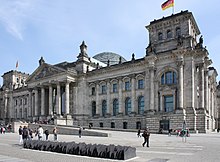Georg Wendt
Georg Wendt (born April 23, 1889 in Köslin , † February 11, 1948 in Berlin ) was a German politician (SPD, SED).
Life
After attending elementary school in Köslin, Wendt completed an apprenticeship as a glazier. In addition, he was taught at the advanced training school. He then worked as a glazier's assistant. Around 1910 Wendt joined the Social Democratic Party of Germany (SPD). In 1912 he married. From March 1915 to 1918, Wendt took part in the First World War. In 1918, Wendt had to give up his old job due to suffering he had suffered during the war. From then on he worked as an office clerk at the local health insurance fund, and from 1921 at the Wedding District Office . After the November Revolution of 1918, Wendt temporarily belonged to the USPD as a representative of the left wing of the SPD , a split-off party that was mainly recruited from left-wing SPD members.
From 1919 to 1920, Wendt was a member of the Brandenburg Provincial Parliament . From 1921 to 1929 he was also a district and city councilor in Berlin.
From 1925 he was an unpaid city councilor in the Schöneberg district of Berlin , where he was also a member of the SPD's district executive. In the Reichstag elections of May 1928 Wendt was a candidate of the SPD for the constituency 3 (Potsdam II) in the Reichstag voted, which he initially until the election of September 1930 was a member. After almost two years of absence from the German parliament, Wendt returned to the Reichstag for his old constituency in the Reichstag elections of July 1932 , which this time he belonged to until the November 1932 election . Since July 1932, Wendt was also party secretary of the SPD for the Berlin-Schöneberg district.
After the National Socialist “ seizure of power ” in the spring of 1933, Wendt was taken into “protective custody” from July to December 1933 and held in the Brandenburg concentration camp . From 1934 to 1943 Wendt lived as the owner of a coal shop in Berlin-Steglitz . During these years, Wendt and his family were subjected to various harassments by the Nazi regime, among other things their arbor was taken from them because of “lack of the right attitude”. During these years he was supported by, among others, Paul Löbe and Julius Leber , in whose coal plant Wendt occasionally found shelter. In 1944, Wendt reported to the Wehrmacht in order to avoid the wave of arrests of the Nazi regime against "men of the system time " (politicians of the Weimar Republic) that was rolling in at the time .
After the war, Wendt rejoined the SPD. In 1946 he became a member of the SED .
Commemoration
Today, among other things, a memorial plaque, which is part of the memorial for 96 Reichstag members murdered by the Nazi regime near the Berlin Reichstag, commemorates Wendt's life and political activities. According to the plaque, Wendt was in the Brandenburg prison; the Brandenburg concentration camp, in which Wendt was a prisoner in 1933, was located in the old prison in the city of Brandenburg.
Web links
- Georg Wendt in the database of members of the Reichstag
Individual evidence
- ↑ Martin Schumacher (Ed.): MdR The Reichstag members of the Weimar Republic in the time of National Socialism. Political persecution, emigration and expatriation 1933-1945. Droste-Verlag, Düsseldorf 1991, ISBN 3-7700-5162-9 , p. 619.
- ↑ Eberhard Kolb (ed.), Albert Grzesinski: In the fight for the German republic. Memoirs of a Social Democrat , 2001, p. 348.
- ↑ Memory of 96 members of the Reichstag murdered by the Nazi regime
| personal data | |
|---|---|
| SURNAME | Wendt, Georg |
| BRIEF DESCRIPTION | German politician (SPD, SED), MdR |
| DATE OF BIRTH | April 23, 1889 |
| PLACE OF BIRTH | Koslin |
| DATE OF DEATH | February 11, 1948 |
| Place of death | Berlin |
